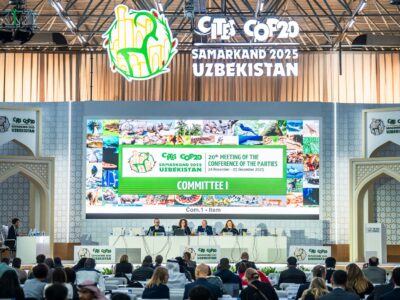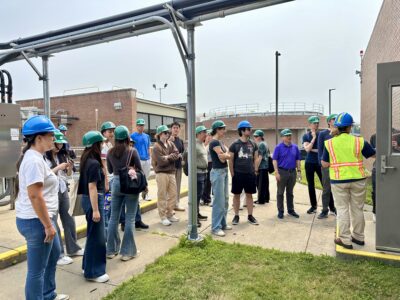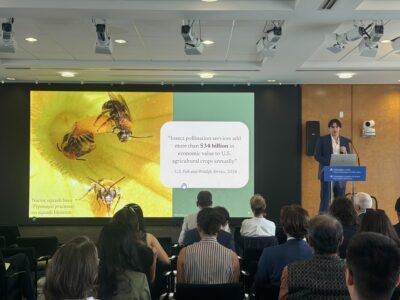
MPA in Environmental Science and Policy alum, Olin Berger (’14) is putting his degree to use this summer as a member of the Environmental Defense Fund Climate Corps in Chicago, Illinois. Olin is working to analyze energy efficiency projects for high rise office buildings in downtown Chicago.
1. What is your current job?
I am currently a fellow in the Climate Corps program managed by the Environmental Defense Fund. I am working with GlenStar Asset Management, a real estate development and management firm based in Chicago. My current project involves analyzing energy efficiency projects for one of their office-high rises in the downtown area and assessing the building’s potential for participation in demand response programs.
2. Do your current job responsibilities align with the professional goals that you originally had when you began the Master of Public Administration in Environmental Science and Policy program (MPA-ESP)?
I applied to the MPA-ESP program with the intent of working in the private or non-profit sector upon graduation. My current responsibilities range from direct data gathering and examination of building system energy use to energy efficiency program development, tenant engagement, and financial analysis. I believe that these skills are beneficial in all work environments and are not tied to any one sector. The analytical and communicative skills I have strengthened through this program will assist me in the future regardless of my specific career path. One of the greatest benefits of my current position has been the network of motivated and incredibly knowledgeable Climate Corps fellows and associated professionals to which I have been given access.
3. What skills has the MPA-ESP program taught you that you think have proven useful to your current position?
It has been funny to me how many parallels I can draw between my current fellowship and the MPA-ESP Workshop in Applied Earth Systems Management. Both programs ask for high-level deliverables within a demanding timeframe and require personal initiative and self-management. My experience with the MPA-ESP Workshop had me fully prepared to develop a work plan for my fellowship, left me ready to quickly assimilate unfamiliar areas of knowledge, and gave me the pragmatism to match my program goals to my circumstances. Perhaps most importantly, it gave me the communicative skills to act as an intermediary between diverse stakeholders and present my findings in a manner that is easily accessible and most likely to promote implementation.
4. What skills and tools do you hope to acquire through this job?
Prior to this fellowship I had little to no direct experience with energy efficiency projects or commercial building energy use. I hope to develop a working vocabulary of the “language” used within these fields to be able to better communicate with the various professionals working in the energy sector. I also hope to gain insights into the manner in which buildings utilize energy in order to determine how such needs can be minimized. My Climate Corps fellowship should strengthen the analytical and communicative skills that I developed in the MPA-ESP program. As well, I hope to further expand my financial competence in order to be able to display the monetary benefit to the energy programs that I am constructing. As I mentioned previously, one of the most powerful tools this program has provided is the network of professionals in the energy sector that I will leverage when planning the next step in my career.
5. How has collaborating with your fellow students in class projects benefited you professionally and personally?
Collaborating with my classmates provided some of the best (and most challenging) experiences I had during the MPA-ESP program. However, even the bad experiences were helpful as they mirrored the issues that I have had to face professionally. The challenges I faced collaborating with my classmates prepared me to deal with similar issues of communication, time and inter-personal management. On the upside, I also had wonderful collaborative experiences that showed me how much more can be achieved by a motivated group than by a single individual. This knowledge has propelled me to seek outside input and partnerships instead of trying to tackle all of my projects alone. I think that this tendency for inclusion and collaboration has increased the efficacy and transparency of all of my work.
6. How do you intend to utilize your degree from the MPA-ESP program to further your career?
The MPA-ESP program provided me with the knowledge about climate change and anthropogenic effects on the earth that created the foundation for the way that I will approach my future professions. The skills that I developed during the program have taught me to be a more effective co-worker and communicator, both of which will assist my career development. This degree has also opened the door to a huge network of Columbia alumni and professionals in the sustainability sector. I am sure that I will make consistent use of the connections that this degree has allowed me to development throughout the remainder of my career.
Students in the MPA in Environmental Science and Policy program enroll in a year-long, 54-credit program offered at Columbia University’s School of International and Public Affairs, in partnership with the Earth Institute.
Since it began in 2002, the MPA in Environmental Science and Policy program has given students the hands-on experience, and the analytical and decision-making tools to implement effective environmental and sustainable management policies. The program’s 682 graduates have advanced to jobs in domestic and international environmental policy, working in government, private and non-profit sectors. Their work involves issues of sustainability, resource use and global change, in fields focused on air, water, climate, energy efficiency, food, agriculture, transportation and waste management. They work as consultants, advisers, project managers, program directors, policy analysts, teachers, researchers, and environmental scientists and engineers.
Visit our website for more information: http://mpaenvironment.ei.columbia.edu/



